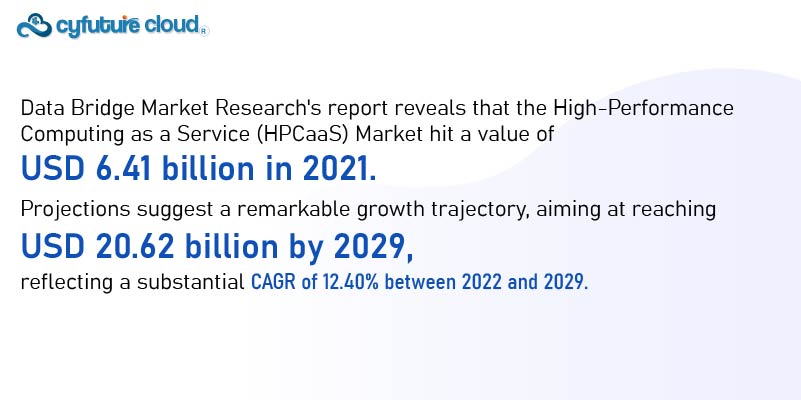Table of Contents
Data Bridge Market Research’s report reveals that the High-Performance Computing as a Service (HPCaaS) Market hit a value of USD 6.41 billion in 2021. Projections suggest a remarkable growth trajectory, aiming at reaching USD 20.62 billion by 2029, reflecting a substantial CAGR of 12.40% between 2022 and 2029.
|
Did You Know? Market Research’s report reveals that the High-Performance Computing as a Service (HPCaaS) Market hit a value of USD 6.41 billion in 2021. Projections suggest a remarkable growth trajectory, aiming at reaching USD 20.62 billion by 2029, reflecting a substantial CAGR of 12.40% between 2022 and 2029. |
This in-depth market analysis highlights High-Performance Computing as a Service (HPCaaS) as a transformative force in cloud hosting, redefining possibilities for businesses. This innovative approach merges high-performance computing within a cloud environment, unlocking numerous advantages and reshaping the cloud hosting landscape.
The impact of hpc-as-a-service spans various industry segments, including cloud hosting and cloud storage in India, signaling its broad market scope and size.
In this blog, we delve into how HPCaaS is revolutionizing cloud hosting, showcasing how businesses leverage its computational power to reshape the cloud hosting landscape. But first, let’s delve into the fundamentals of HPCaaS.
Grasping the Rise of High-Performance Computing as a Service: Key Insights
Traditionally, high-performance computing (HPC) has been instrumental for swift data processing in research and scientific domains. Yet, the advent of high-performance computing as a service (HPCaaS) signifies a transformative change in how businesses and organizations leverage this powerful technology.
HPC-as-a-Service operates as a cloud-based model, providing users with on-demand access to high-performance computing resources. This innovative approach eliminates the need for substantial upfront investments in hardware and infrastructure, allowing organizations to seamlessly leverage HPC capabilities. The shift to HPCaaS is driven by increasing demands for data processing, the rise of big data, and the need for cost-effective, scalable computing solutions.
The rise of big data has triggered an exponential escalation in data volume that businesses and organizations must swiftly process and analyze. Traditional computing systems often struggle with handling these extensive datasets, resulting in sluggish processing speeds and inefficiencies. HPCaaS presents a viable solution by granting access to robust computing resources adept at promptly and efficiently managing substantial data volumes.
Moreover, setting up and maintaining an in-house HPC system can pose financial barriers for many organizations. HPCaaS, by contrast, offers a financially pragmatic solution, eliminating the need for upfront hardware and infrastructure investments. Instead, users pay solely for the computing resources they consume, enabling seamless scaling based on fluctuating requirements. This adaptability renders HPCaaS appealing across the spectrum, from startups to corporate giants.
Beyond cost-efficiency, HPCaaS boasts additional advantages. It grants users access to cutting-edge technology and hardware without the hassle of routine upgrades and maintenance. This not only saves resources but also ensures continual leverage of the latest HPC innovations. Furthermore, HPCaaS providers often extend support and expertise, aiding users in optimizing their usage and addressing any technical hurdles.
However, embracing HPCaaS isn’t lacking of challenges. Security concerns loom large, necessitating trust in service providers to safeguard user data. Moreover, network latency can affect HPCaaS performance, especially during extensive data processing. Nonetheless, providers are actively investing in advanced security measures and bolstering network infrastructure to mitigate these challenges.
The ascent of High-Performance Computing as a Service (HPCaaS) marks a pivotal shift in how businesses wield computational prowess. Its capacity to democratize high-powered computing, offering cost-effective scalability, positions it as a catalyst propelling innovation across diverse industries.
The Impact on Cloud Hosting
High performance computing as a service significantly impacts the working of cloud hosting. Let’s have a quick look at some of its effects:
1. Enhanced Computational Power:
HPCaaS integrates the immense computational power of high-performance computing with the scalability and flexibility of cloud hosting. It empowers businesses to execute complex calculations, simulations, and data analysis tasks rapidly and efficiently.
2. Scalability and Flexibility:
Businesses can scale their computing resources up or down based on their needs, paying only for what they use. This flexibility allows them to handle varying workloads, ensuring optimal performance without unnecessary expenditures.
3. Accelerated Workloads:
HPCaaS’s parallel processing capabilities drastically cut down the time required for processing extensive datasets and complex computations. Tasks that once took hours or days can now be completed in a fraction of the time, boosting productivity and accelerating time-to-market for businesses.
4. Cost-Efficiency:
By adopting HPCaaS in cloud hosting, companies can save substantial costs on infrastructure maintenance and upgrades. They avoid the capital expenses associated with purchasing and maintaining HPC hardware while benefiting from a pay-as-you-go model.
5. Innovation and Competitiveness:
Unlocking high-performance computing via the cloud empowers businesses across scales, fostering innovation by enabling swift experimentation, prototyping, and the development of new products or services.
6. Scientific and Research Advancements:
In fields like scientific research, healthcare, and engineering, HPCaaS enables breakthroughs by facilitating complex simulations, genomic analysis, drug discovery, weather forecasting, and more.
How businesses leverage HPCaaS power to reshape cloud hosting
Businesses harness High-Performance Computing as a Service (HPCaaS) to revolutionize cloud hosting, reshaping the landscape in several ways:
Enhanced Performance: HPCaaS empowers businesses with unparalleled computational capabilities, accelerating complex tasks and analyses. This agility fosters rapid innovation, enabling quicker product development, simulations, and data analyses that were previously time-consuming.
Cost Efficiency: It eliminates the need for extensive hardware investments, offering a pay-as-you-go model. Companies can optimize costs by scaling resources based on their immediate computational needs, avoiding unnecessary infrastructure expenses.
Scalability and Flexibility: HPCaaS’s on-demand scalability allows businesses to adjust resources in real-time. This flexibility ensures adaptability to changing computational requirements, preventing underutilization or overprovisioning.
Advanced Data Processing: With the surge in big data, HPCaaS provides the necessary tools to handle vast datasets efficiently. This capability aids in extracting valuable insights, enhancing decision-making processes and predictive analytics.
Competitive Edge: Leveraging HPCaaS enables businesses to gain a competitive edge by accelerating time-to-market for innovative solutions, optimizing operations, and improving customer experiences.
Global Collaboration: Cloud-based HPC fosters collaboration across geographic locations. It facilitates remote teams to collaborate effectively on intricate projects, enabling diverse skill sets to contribute to complex problem-solving.
Security and Compliance: Leading HPCaaS providers prioritize robust security measures and compliance adherence. This ensures that sensitive data is protected, meeting regulatory standards and assuring clients of data integrity.
High Performance Computing As a Service (Hpcaas) Market Dynamics

This segment focuses on comprehending market drivers, benefits, opportunities, limitations, and challenges. Delve into the detailed discussion below:
Drivers
Increase in Data Generation
The surge in data generation across diverse industries stands as a key driver for the High-Performance Computing as a Service (HPCaaS) market. The growing demand for these computing services is fueled by their ability to process real-time data for live sports events streaming and stock trend analysis, propelling market growth.
High Penetration of Internet of Things
The rapid integration of the Internet of Things (IoT) into industrial sectors is driving market acceleration. The widespread adoption of diverse internet-connecting technologies and components is significantly bolstering market growth.
Various Advantages offered by Hpcaas
The escalation in Hpcaas adoption, driven by its numerous advantages like dynamic and automated HPC management, is significantly shaping the market. These services integrate new technologies swiftly.
Moreover, factors like rapid urbanization, lifestyle changes, increased investments, and consumer spending are positively impacting the high-performance computing as a service (Hpcaas) market.
Opportunities
Moreover, the introduction of cluster management software opens lucrative opportunities for market players from 2022 to 2029. The escalating demand for cloud services is expected to further propel market expansion.
Restraints/Challenges
The high cost of system usage and complex cloud platform integration, coupled with rising concerns over data security and legitimacy, pose potential obstacles to the High-Performance Computing as a Service (HPCaaS) market growth from 2022 to 2029.
This HPCaaS market report from Data Bridge Market Research offers insights into market developments, trade regulations, production analysis, market share, and more.
Future Implications of HPCaaS
As technology continues to evolve, the integration of High-Performance Computing as a Service into cloud hosting is expected to have far-reaching implications. The fusion of HPC and cloud brings unparalleled efficiency, agility, and accessibility, transcending limitations and unlocking new possibilities for various industries.
The future implications of High-Performance Computing as a Service (HPCaaS) are poised to revolutionize various sectors:
Advanced Research and Innovation: HPCaaS will push the boundaries of scientific research and innovation. It will enable scientists and researchers to solve complex problems, conduct simulations, and analyze vast datasets faster, leading to breakthroughs in medicine, climate science, and technology.
Simulations and Modelling: HPCaaS allows researchers to create highly accurate simulations and models, allowing them to explore and test hypotheses. This is particularly vital in industries like aerospace, automotive, and pharmaceuticals, where extensive simulations can significantly reduce the need for costly physical prototypes and experiments.
It’s become an essential tool for researchers and innovators, enabling exploration of intricate systems, streamlined design optimization, and informed, data-driven decision-making. In finance and insurance, HPC simulations model risk, assess financial portfolios, and project potential impacts of diverse economic scenarios.
Artificial Intelligence and Machine Learning: The growth of AI and machine learning relies heavily on massive data processing. HPCaaS will fuel the development of sophisticated AI algorithms, enhancing predictive analytics, natural language processing, and autonomous systems.
Personalized Healthcare: In healthcare, HPCaaS will facilitate precision medicine by analyzing individual genetic data to tailor treatments. This technology can speed up drug discovery, identify disease patterns, and improve patient care through advanced diagnostics.
Smart Cities and IoT: The future of smart cities and the Internet of Things (IoT) depends on robust computational power. HPCaaS will enable the real-time processing of massive data streams from sensors, optimizing city infrastructure, transportation, and public services.
Enhancing Product Design and Engineering: Urban planners can benefit from HPCaaS’s assistance in traffic pattern modelling, infrastructure project optimisation, and evaluating how development affects a city’s environment and resources. The use of HPCaaS has revolutionised engineering.
Aeronautics, structural engineering, and automobile design all require complex simulations that are computationally demanding and need for great performance under a variety of circumstances without necessitating a large internal infrastructure. By employing quick and accurate simulations, engineers may create more creative and efficient products, which lowers costs and improves results. This guarantees the production of safer and more dependable goods while also speeding up the product development cycle.
Climate Modeling and Sustainability: Addressing climate change requires vast computational resources for modeling climate scenarios. HPCaaS will aid in creating accurate climate models, optimizing renewable energy solutions, and developing sustainable practices.
Financial Services: HPCaaS will drive innovation in the financial sector by enhancing risk analysis, fraud detection, and algorithmic trading. It will enable faster and more accurate predictions, improving decision-making and market strategies.
Education and Training: HPCaaS will democratize access to high-performance computing resources for educational institutions. It will empower students and researchers to experiment, innovate, and learn advanced computational techniques.
The future implications of HPCaaS are vast and multifaceted, transforming industries and driving innovation across various domains, ultimately shaping the way we work, live, and interact with technology.
Conclusion
High-Performance Computing as a Service (HPCaaS) marks a pivotal shift in accessing and utilizing HPC. Despite challenges, its benefits—cost efficiency, scalability, and cutting-edge tech access—are enticing. With the escalating demand for data processing, HPCaaS adoption is poised to soar. Understanding its implications is key for businesses to thrive in today’s data-centric world.
HPCaaS is a transformative force in cloud hosting, enabling groundbreaking feats. Its evolution promises profound impacts on businesses, reshaping computing and tech advancements. This integration ushers in an era of potent computational power, scalability, and innovation, empowering businesses to excel in the digital landscape.
Recent Post
Send this to a friend

 Server
Colocation
Server
Colocation CDN
Network
CDN
Network Linux
Cloud Hosting
Linux
Cloud Hosting Kubernetes
Kubernetes Pricing
Calculator
Pricing
Calculator
 Power
Power
 Utilities
Utilities VMware
Private Cloud
VMware
Private Cloud VMware
on AWS
VMware
on AWS VMware
on Azure
VMware
on Azure Service
Level Agreement
Service
Level Agreement 




















